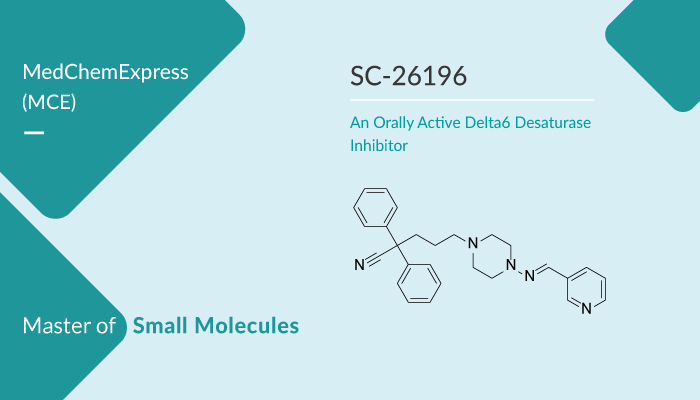Polyunsaturated fatty acids (PUFAs) play key roles in the immune response. They act as substrates for the synthesis of lipid second messengers involved in cell activation. It includes eicosanoids and for cell membrane biosynthesis Immune cells can obtain PUFA from lipoproteins and non-esterified fatty acids in blood or by synthesis from essential fatty acids. The consensus (Δ6 desaturation) pathway for conversion of α-linolenic acid (18:3n-3) to longer chain n-3 PUFA, primarily 20:5n-3, 22:5n-3, and 22:6n-3. It involves the rate-limiting insertion of a double bond at the Δ6 position of 18:3n-3. There is some evidence that suggests that immune cells can convert essential fatty acids to longer chain PUFA. In this study, SC-26196 reduces PBMC, but not Jurkat cell, proliferation suggesting PUFA synthesis is involved in regulating mitosis in peripheral blood mononuclear cells (PBMCs).
SC-26196 is a potent, orally active Delta6 desaturase (D6D) inhibitor, with an IC50 value of 0.2 µM in a rat liver microsomal assay. Moreover, SC-26196 shows anti-inflammatory properties. Furthermore, SC-26196 significantly decreases the proportion of cells that underwent division in PBMCs. The division index and proliferation index at 96 h corresponds to the end of the exponential growth phase. Thus, SC-26196 significant decreases in PBMC viability. But, SC-26196 does not alter cell proliferation significantly in Jurkat cells. In addition, SC-26196 causes a decrease in the calculated Δ6-desaturase index in both adipose tissue and liver. Feeding 100 mg SC-26196 per kg BW per day inhibits the Δ6-desaturase enzyme.
In summary, SC-26196 is a potent D6D inhibitor. PBMC activation induces hypermethylation of a 470bp region in the FADS2 5′-regulatory sequence. This has implications for understanding the regulation of mitosis in normal and transformed lymphocytes.

Reference:
Sibbons CM, et al. Front Immunol. 2018 Mar 5;9:432.